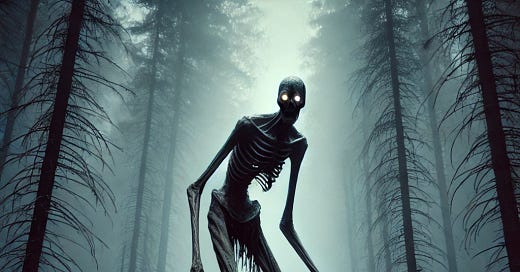Foreword
Algernon Blackwood’s The Wendigo stands as a timeless pillar in the genre of supernatural fiction, resonating with readers over a century after its first publication. In this novella, Blackwood masterfully merges the stark, indifferent wilderness with an ancient and terrifying myth, drawing readers into a world where the boundaries between the known and the unknown blur with every turn of the page.
Set deep in the remote Canadian forests, The Wendigo confronts the primal fears of isolation, madness, and the uncontrollable forces of nature. Blackwood, well-versed in occultism and mysticism, imbues his tale with a sense of spiritual dread, where the vast wilderness serves not just as a backdrop, but as a living, breathing entity capable of consuming those who dare venture too far into its depths.
The story draws upon the myth of the Wendigo, a creature rooted in Algonquin folklore—a malevolent force said to possess humans, driving them to acts of cannibalism and unspeakable violence. Blackwood’s portrayal of the Wendigo, however, transcends mere legend. It is not just a beast, but a symbol of the wilderness’s power to transform and destroy, reminding us of humanity's fragility in the face of the unknown.
What makes The Wendigo particularly chilling is Blackwood’s ability to evoke terror through atmosphere rather than outright horror. His characters, lost in a landscape both physically and psychologically alien, grapple not just with the possibility of the supernatural but with their own tenuous grasp on reality. This tension between rational thought and inexplicable fear is where Blackwood’s genius shines—readers are never quite sure where the line between human and monster lies, and perhaps that is the most unsettling aspect of the tale.
As you begin this journey into the wild, prepare yourself for a story that is less about the creature lurking in the shadows, and more about the creeping realization that some forces, be they supernatural or natural, are beyond our understanding or control. Blackwood does not simply tell a ghost story; he immerses us in a world where the unknown is not just terrifying—it is inescapable.
In The Wendigo, the wilderness is not just a setting, but a character in its own right—a vast, unknowable force that swallows men whole, leaving only the faintest whispers of what they once were. Prepare to be drawn into the darkness, where the wind howls not with menace, but with the haunting promise that something ancient still walks among the trees.
Gio Marron
Video by Gates if Imagination YouTube channel*
Narrated by Arthur Lane
*Not affiliated with The Elephant Island Chronicles.
Text courtesy of Project Gutenberg: The Wendigo by Algernon Blackwood
Also available on Amazon: The Wendigo by Algernon Blackwood
Do you like what you read but aren’t yet ready or able to get a paid subscription? Then consider a one-time tip at:
https://www.venmo.com/u/TheCogitatingCeviche







If The Wendigo is anything like The Centaur, by Algernon Blackwood, I am so looking forward to listening to this tonight. The Centaur haunted me for decades, bc it was included in a horror anthology I read long ago, but couldn't recall who wrote it, or even the title of it. I finally found it and it was truly a mix of strangeness and beauty and otherworldly longing and of things unseen, but sensed. Lovers of Stephen King or Clive Barker style of horror would've been disappointed, I'm sure. Anyway, thank you for posting this. I can't wait to get into it.
I love Algernon Blackwood's "The Wendigo," and there have been several attempts to bring it tothe screen, but I haven't found that any of them capture the haunting nature of Blackwood's wonderful elusive writing.